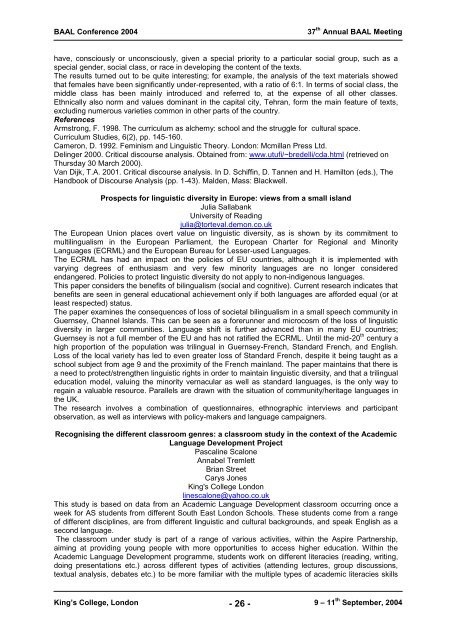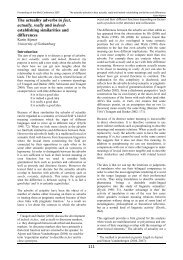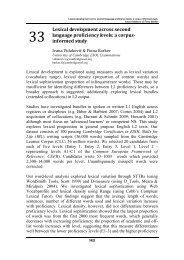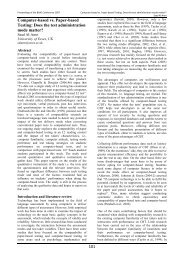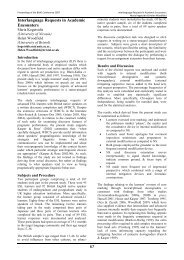Colloquia - British Association for Applied Linguistics
Colloquia - British Association for Applied Linguistics
Colloquia - British Association for Applied Linguistics
Create successful ePaper yourself
Turn your PDF publications into a flip-book with our unique Google optimized e-Paper software.
BAAL Conference 2004 37 th Annual BAAL Meeting<br />
have, consciously or unconsciously, given a special priority to a particular social group, such as a<br />
special gender, social class, or race in developing the content of the texts.<br />
The results turned out to be quite interesting; <strong>for</strong> example, the analysis of the text materials showed<br />
that females have been significantly under-represented, with a ratio of 6:1. In terms of social class, the<br />
middle class has been mainly introduced and referred to, at the expense of all other classes.<br />
Ethnically also norm and values dominant in the capital city, Tehran, <strong>for</strong>m the main feature of texts,<br />
excluding numerous varieties common in other parts of the country.<br />
References<br />
Armstrong, F. 1998. The curriculum as alchemy: school and the struggle <strong>for</strong> cultural space.<br />
Curriculum Studies, 6(2), pp. 145-160.<br />
Cameron, D. 1992. Feminism and Linguistic Theory. London: Mcmillan Press Ltd.<br />
Delinger 2000. Critical discourse analysis. Obtained from: www.utufi/~bredelli/cda.html (retrieved on<br />
Thursday 30 March 2000).<br />
Van Dijk, T.A. 2001. Critical discourse analysis. In D. Schiffin, D. Tannen and H. Hamilton (eds.), The<br />
Handbook of Discourse Analysis (pp. 1-43). Malden, Mass: Blackwell.<br />
Prospects <strong>for</strong> linguistic diversity in Europe: views from a small island<br />
Julia Sallabank<br />
University of Reading<br />
julia@torteval.demon.co.uk<br />
The European Union places overt value on linguistic diversity, as is shown by its commitment to<br />
multilingualism in the European Parliament, the European Charter <strong>for</strong> Regional and Minority<br />
Languages (ECRML) and the European Bureau <strong>for</strong> Lesser-used Languages.<br />
The ECRML has had an impact on the policies of EU countries, although it is implemented with<br />
varying degrees of enthusiasm and very few minority languages are no longer considered<br />
endangered. Policies to protect linguistic diversity do not apply to non-indigenous languages.<br />
This paper considers the benefits of bilingualism (social and cognitive). Current research indicates that<br />
benefits are seen in general educational achievement only if both languages are af<strong>for</strong>ded equal (or at<br />
least respected) status.<br />
The paper examines the consequences of loss of societal bilingualism in a small speech community in<br />
Guernsey, Channel Islands. This can be seen as a <strong>for</strong>erunner and microcosm of the loss of linguistic<br />
diversity in larger communities. Language shift is further advanced than in many EU countries;<br />
Guernsey is not a full member of the EU and has not ratified the ECRML. Until the mid-20 th century a<br />
high proportion of the population was trilingual in Guernsey-French, Standard French, and English.<br />
Loss of the local variety has led to even greater loss of Standard French, despite it being taught as a<br />
school subject from age 9 and the proximity of the French mainland. The paper maintains that there is<br />
a need to protect/strengthen linguistic rights in order to maintain linguistic diversity, and that a trilingual<br />
education model, valuing the minority vernacular as well as standard languages, is the only way to<br />
regain a valuable resource. Parallels are drawn with the situation of community/heritage languages in<br />
the UK.<br />
The research involves a combination of questionnaires, ethnographic interviews and participant<br />
observation, as well as interviews with policy-makers and language campaigners.<br />
Recognising the different classroom genres: a classroom study in the context of the Academic<br />
Language Development Project<br />
Pascaline Scalone<br />
Annabel Tremlett<br />
Brian Street<br />
Carys Jones<br />
King's College London<br />
linescalone@yahoo.co.uk<br />
This study is based on data from an Academic Language Development classroom occurring once a<br />
week <strong>for</strong> AS students from different South East London Schools. These students come from a range<br />
of different disciplines, are from different linguistic and cultural backgrounds, and speak English as a<br />
second language.<br />
The classroom under study is part of a range of various activities, within the Aspire Partnership,<br />
aiming at providing young people with more opportunities to access higher education. Within the<br />
Academic Language Development programme, students work on different literacies (reading, writing,<br />
doing presentations etc.) across different types of activities (attending lectures, group discussions,<br />
textual analysis, debates etc.) to be more familiar with the multiple types of academic literacies skills<br />
King‟s College, London 9 – 11 th - 26 -<br />
September, 2004


